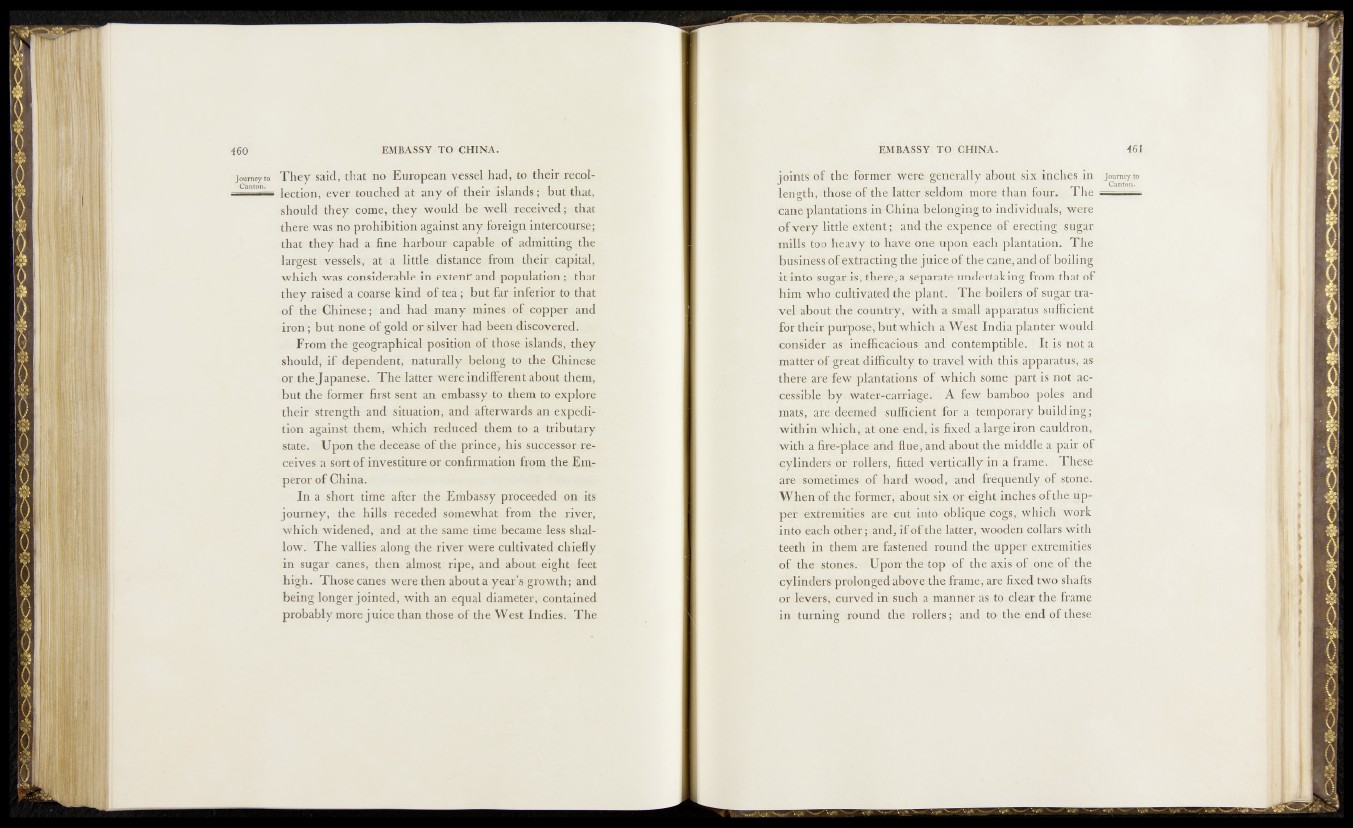
They said, that no European vessel had.'to.^t-hseitijifCQl'-
lection, ever touched at any of theirTslafids:; :biut{that,
should they come, they Would be well receded*; 7-that
there was no prohibition against any foreigh intercoupe;
that theydiad a fine
largest vessels, a t: a little■ distance from tffij&r, capital,
which was considerable in extent* and populatioii; that
they raisedsa-’eoarse kind of tea; but J ^ ip fM io f to that
of the Chineses and had many mines o f,copper and
iro n ; but nonds&f gold o r silver* had been discovered. yta
From the geographical-position ofithoserislands, they
should, i f dependent, naturally belong to then,Chinese
or the Japanese. The latter were indifferent about them,
but the former first sent an embassy to them to- explore
their strength and situation, and afterwards, an e^p^^?
tion against them, which reduced them to a. tributary
state. Upon the decease of the prince, his supfg^gafre-
(MiiyeWli sort of investUitre or confirmation from
peror o f China.
In. a short time after the Embassy proceeded, ion- its
journey, the hills receded somewhat -from the river,
which widened, and at the same time became, less shallow.
The vallies along, d^^iver were cultivated ch if fly
in sugar canes, then almost ripe, and about eight feet
high. Those canes were then about a year’s ^growth; and
being longer jointed, with an equal diameter, contained
probably, more juice than those of the West Indies. The
joiaftl-dE 'the formen W,©r^^^iRally'about rsj<x-Inches in journey to
leiiffthvdhose>of tHe,f^feter^sfldom more “than four. The
canMpiaffia®Us in C h i n t o i'mid%-i;#ila$^|sfg|ie
of Yteiiy little ext'ent^a^dlithel^pepcq^of^ere'eMrigj Sugar
mills tcro^healGy ifco havef^pe^uppi^.^phi^plantatibn. The
business ofiexfiracting the juipejpfftl^eti^qe,, ^ar^p^^iling
it intorsjusg'ar is, there,-a separate’undeijtakjn'g^fritflaj that of
him who cultivated tiheplantl'’ Th^||@ileESf|>£ sn^ar ;tra-
vefeabpeut thdfcojaptr'y, with a giapall'apparatus Sufficient
for their purpose,'but which a West,‘India planter wou^d
fensiflerdasbinefficaciQas^andjfebntpn^ptifile. It,iM^>Hy
iriattdr' of great difficultyi fo^r#>yte| -syith this (appafa)tus,, as
there are“few plantationsiof whichisdfhe part is not^q-
’cessiMe^hy- wate#rfcapiagG;.,v A few. bamboo, , pQfesrjartd
mats, '^£ej deemed sufficient for%y temporary bjuild ing^
within-which,- atlqjie;%id',cSMffiied ajl-arghiron cauldron,
with S fire-placc'and flue, and aboutthc middle a, p'air of
eylindprs air: rollers-, fitted vertically in a fr aine^ 4 Tjhese
arfe f’&ometimes; of hard wood,’and frequently|pj|§fone.
When of the former,; ahout six* or night inchespf the,,u p per
extremities are cut*into .oblique'fcdg^ whjd.hr,work
into -each other ;,and, if ofthe latter, wooden collars with
teeth in them are fastened round the uppetyes^qmitie?
of thei stones,. Upon\fch|j£*tap offjhe.axis' of jjone. of|the
cylinders, prolonged above the frameyare* fixed two shafts
of levers, curved, in such a manner jas to clear the framf
in turning 'round- the. rollers; and to the end oft^ipse'